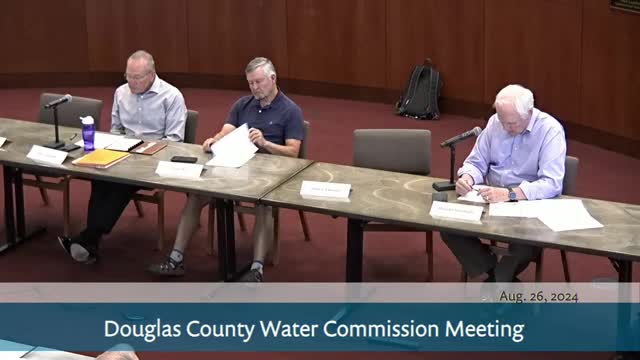Water Appeal Sparks Controversy Over Groundwater Use
August 26, 2024 | Douglas County, Colorado
This article was created by AI summarizing key points discussed. AI makes mistakes, so for full details and context, please refer to the video of the full meeting. Please report any errors so we can fix them. Report an error »

In a recent government meeting, officials discussed a contentious water appeal related to a proposed development in Castle Rock, highlighting concerns over groundwater usage and sustainability. The meeting revealed a significant divide among committee members regarding the implications of the appeal, particularly in light of past water management practices.
One member recounted a previous water appeal process that mandated a comprehensive water plan, requiring at least 70% renewable water at build-out and a detailed plan to address potential impacts on local aquifers. This historical context was presented as a benchmark for evaluating the current appeal, emphasizing the need for stringent water management standards.
Another committee member expressed strong reservations about the proposed development's reliance on 100% groundwater, arguing that the current standards for water demand per residence were insufficient. They raised concerns about the potential for increased housing density if the appeal were approved, which could exacerbate existing water shortages in the region.
The discussion also touched on the lack of an augmentation plan for the groundwater supply, which serves thousands of well owners in Douglas County. The member stressed the importance of developing renewable water sources, citing successful initiatives in nearby areas as models for sustainable development.
A third member, representing Castle Rock, questioned whether they should recuse themselves from the discussion due to potential financial implications of the appeal. However, it was clarified that their interest was not direct enough to warrant recusal.
The meeting concluded with a clear sentiment among several members that the proposed appeal did not align with sustainable water management practices, urging a cautious approach to any decisions regarding the development. The ongoing debate underscores the complexities of balancing growth with environmental stewardship in rapidly developing areas.
One member recounted a previous water appeal process that mandated a comprehensive water plan, requiring at least 70% renewable water at build-out and a detailed plan to address potential impacts on local aquifers. This historical context was presented as a benchmark for evaluating the current appeal, emphasizing the need for stringent water management standards.
Another committee member expressed strong reservations about the proposed development's reliance on 100% groundwater, arguing that the current standards for water demand per residence were insufficient. They raised concerns about the potential for increased housing density if the appeal were approved, which could exacerbate existing water shortages in the region.
The discussion also touched on the lack of an augmentation plan for the groundwater supply, which serves thousands of well owners in Douglas County. The member stressed the importance of developing renewable water sources, citing successful initiatives in nearby areas as models for sustainable development.
A third member, representing Castle Rock, questioned whether they should recuse themselves from the discussion due to potential financial implications of the appeal. However, it was clarified that their interest was not direct enough to warrant recusal.
The meeting concluded with a clear sentiment among several members that the proposed appeal did not align with sustainable water management practices, urging a cautious approach to any decisions regarding the development. The ongoing debate underscores the complexities of balancing growth with environmental stewardship in rapidly developing areas.
View the Full Meeting & All Its Details
This article offers just a summary. Unlock complete video, transcripts, and insights as a Founder Member.
✓
Watch full, unedited meeting videos
✓
Search every word spoken in unlimited transcripts
✓
AI summaries & real-time alerts (all government levels)
✓
Permanent access to expanding government content
30-day money-back guarantee

